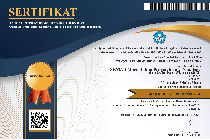Efektifitas Penyuluhan Epilepsi Terhadap Tingkat Pengetahuan Kader PMR SMA/SMK Surakarta Tentang Penyakit Epilepsi dan Penanganan Kedaruratan pada Kasus Kejang
Abstract
Epilepsi merupakan salah satu penyakit saraf yang menjadi permasalahan kesehatan masyarakat global. Prevalensi epilepsi di Indoesia berdasarkan data dari Departemen Kesehatan tahun 2018 sebesar 1.8 juta. Insidensi epilepsi berkisar 50.4 per 100.000 populasi pertahun dengan 80% pasien epilepsi di dunia terjadi di negara berkembang. Penderita epilepsi sering mendapatkan stigma negatif di masyarakat. Pentingnya penyuluhan mengenai informasi terkait epilepsi pada masyarakat khususnya pada kader PMR diharapkan dapat memberikan informasi secara lebih lengkap terkait epilepsi sekaligus sebagai pemutus stigma. Penelitian ini dibuat untuk mengetahui efektivitas penyuluhan epilepsi terhadap tingkat pengetahuan kader PMR SMA/SMK Surakarta mengenai penyakit epilepsi dan penanganan kedaruratan pada kasus kejang. Penyelenggaraan penyuluhan diikuti oleh 159 responden yang berasal dari 70 SMA/SMK se-karesidenan Surakarta dengan masing-masing mengirimkan minimal 2 perwakilan PMR. Sebelum dan sesudah penyuluhan dilakukan evaluasi terkait pengetahuan peserta mengenai epilepsi melalui pretest dan posttest. Data hasil evaluasi menunjukkan adanya perbaikan pengetahuan peserta dari skor rata rata awal 74.12 menjadi 82.5.
Kata kunci : epilepsi, penyuluhan, anggota PMR
Full Text:
PDFReferences
Lukas A, Hastuti, Harsono. Gangguan Kognitif Pada Epilepsi.
World Health Organization. www.who.int/mental_health/management/globalepilepsycampaign/. 2005. Atlas: Epilepsy Care in the World 2005 .
Fatmi KN, Roshinta D, Dewi L, In’am Ilmiawan M. The Relation of Duration of Epilepsy, Seizure Frequency and AED Adherence With Cognitive Function in Epilepsy Patients. Vol. 4.
Ay R. Epilepsy and Stigmatization: A review. Journal of Clinical Psychiatry. 2017;20(2):129–36.
Camfield P, Camfield C. Incidence, prevalence and aetiology of seizures and epilepsy in children. Epileptic Disorders. 2015 Jun 1;17(2):117–23.
Bellon M. Epilepsy and Memory. In: The Epilepsy Report. 2007. p. 6–7.
Fisher RS, Acevedo C, Arzimanoglou A, Bogacz A, Cross JH, Elger CE, et al. ILAE Official Report: A practical clinical definition of epilepsy. Epilepsia. 2014 Apr 14;55(4):475–82.
Berg AT, Berkovic SF, Brodie MJ, Buchhalter J, Cross JH, Van Emde Boas W, et al. Revised terminology and concepts for organization of seizures and epilepsies: Report of the ILAE Commission on Classification and Terminology, 2005–2009. Epilepsia. 2010 Apr;51(4):676–85.
Hart YM. Epidemiology, natural history and classification of epilepsy. Medicine. 2012 Sep;40(9):471–6.
Agarwal R, Patel R, Set K, Zidan M, Sivaswamy L. Safety, Awareness, and Familiarity regarding Epilepsy in Teenage Years (SAFETY): Understanding the adolescents’ perspective about their disease. Epilepsy and Behavior. 2014 Dec 1;41:114–8.
Ferdian, Dani, dkk. Pengaruh Edukasi Kesehatan untuk Meningkatkan Pengetahuan tentang Kesehatan Mental. 2024. Mahesa: Malahayati Health Student Journal, Volume 4 Nomor 5 Tahun 2024] HAL 2058-2067.
Umar, Parakiti, dkk. Pengaruh Edukasi terhadap Pemahaman Masyarakat dalam Upaya Pencegahan Covid-19 di Ruang Pelayanan Kantor Camat Panakkukang. 2021. Window of Nursing Journal, Vol. 02 No. 02 (Desember, 2021): 156 – 164
Abou Khaled KJ, Ibrahim MI, Moussa RF. Impact of epilepsy training on school teachers and counselors: An intervention study in Lebanon. Epilepsy Behav Rep. 2020 Apr 29;14:100365. doi: 10.1016/j.ebr.2020.100365. PMID: 32435757; PMCID: PMC7232080.
Pulimeno M, Piscitelli P, Colazzo S, Colao A, Miani A. School as ideal setting to promote health and wellbeing among young people. Health Promot Perspect. 2020 Nov 7;10(4):316-324. doi: 10.34172/hpp.2020.50. PMID: 33312927; PMCID: PMC7723000.
Mecarelli O, Messina P, Capovilla G, Michelucci R, Romeo A, Beghi E; Epischool Collaborative Group of the Lega Italiana contro l'Epilessia (LICE); De Simone R, Cerquiglini A, Vecchi M, Boniver C, Monti F, Ferlazzo E, Gasparini S, Baldassarri C, Cesaroni E, Stranci G, Elia M, Severi S, Pizzanelli C, Ausserer H, Montalenti E, Pieri I, Germano M, Cantisani T, Casellato S, Pruna D. An educational campaign about epilepsy among Italian primary school teachers. 2. The results of a focused training program. Epilepsy Behav. 2015 Jan;42:93-7. doi: 10.1016/j.yebeh.2014.07.022. Epub 2014 Dec 12. PMID: 25500360.
Sulena S, Singh G, Tyagi D, Bansal N, Padda P, Garg R, Kumar R, Kaur K, Kaur H, Kumar N. Epilepsy Smart Schools: Educational intervention improves knowledge, attitude, and practices regarding epilepsy among school teachers. Epilepsy Behav. 2023 Apr;141:109138. doi: 10.1016/j.yebeh.2023.109138. Epub 2023 Mar 3. PMID: 36871320.
Kirabira J, Forry BJ, Fallen R, Sserwanga B, Rukundo GZ. Perceived stigma and school attendance among children and adolescents with epilepsy in South Western Uganda. Afr Health Sci. 2020 Mar;20(1):376-382. doi: 10.4314/ahs.v20i1.43. PMID: 33402925; PMCID: PMC7750070.
Makhado TG, Sepeng NV, Makhado L. A systematic review of the effectiveness of epilepsy education programs on knowledge, attitudes, and skills among primary school learners. Front Neurol. 2024 Feb 27;15:1356920. doi: 10.3389/fneur.2024.1356920. PMID: 38476196; PMCID: PMC10927725.
Joshi HS, Mahmood SE, Bamel A, Agarwal AK, Shaifali I. Perception of epilepsy among the urban secondary school children of Bareilly district. Ann Indian Acad Neurol. 2012 Apr;15(2):125-7. doi: 10.4103/0972-2327.94996. PMID: 22566726; PMCID: PMC3345589.
Polit, D. F., & Beck, C. T. (2017). Nursing Research: Generating and Assessing Evidence for Nursing Practice (10th ed.). Lippincott Williams & Wilkins.
Heale, R., & Twycross, A. (2015). Validity and reliability in quantitative studies. Evidence-Based Nursing, 18(3), 66-67.
Miller, D. P., & Rollnick, S. (2017). Motivational Interviewing in Health Care: Strategies for Behavioral Change. American Journal of Health Promotion, 31(6), 421-432.
Chen PY, Ho WC, Lo C, Yeh TP. Predicting Ego Integrity Using Prior Ego Development Stages for Older Adults in the Community. Int J Environ Res Public Health. 2021 Sep 8;18(18):9490. doi: 10.3390/ijerph18189490. PMID: 34574413; PMCID: PMC8472379.
Aouani H, Slimani M, Ghouili H, Tod D, Znazen H, Bragazzi NL, Hamrouni S, Chtara M, Elloumi M. Emotional Intelligence: A Systematic Comparison Between Young Athletes and Non-athletes, Gender and Age Groups. International Journal of Sport Studies for Health. 2022 April; 5(1):e128656. Published online
Refbacks
- There are currently no refbacks.























